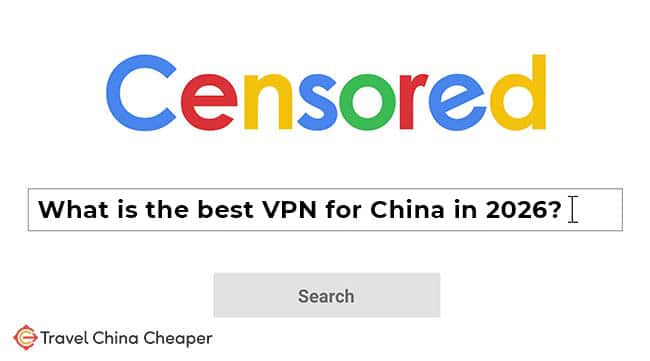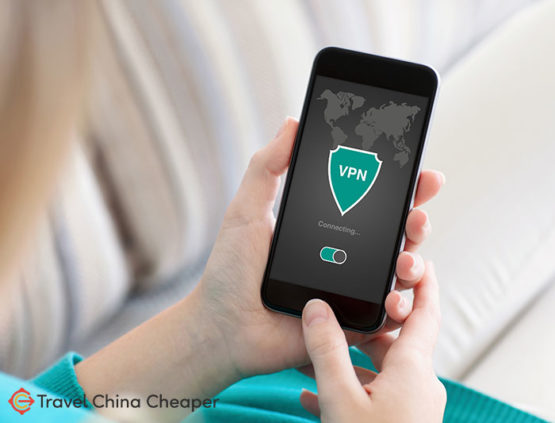What is the best VPN for China in 2026? That’s a loaded question that often gets met with simple answers from people who have never even lived in China. While there are plenty of options to choose from, I’m aiming to not only let you know what works, but also my exact strategy for how to use a VPN and stay connected in China.

January 2026 UPDATE
Throughout COVID-19 and numerous riots these past few years, China has clamped down on the use of VPNs. While connecting to a server is difficult within the country right now, with the right service and enough patience, it is still possible.
Over the past 3 years 6 years 8 years 10 years 15 years, I have been testing a number of VPN services (VPN = “Virtual Private Network”). Because of my business, it’s absolutely necessary that I have unrestricted access to the internet.
With so many different websites and apps blocked in China, I’m almost always connected to a VPN.
Over this period of time, I’ve learned a lot about how China’s internet works – and it’s quite different than what most people expect.
The biggest lesson I’ve learned is this…
…be patient.
At some point, you’re going to be frustrated by censorship.
At some point, you’re going to want to yell at somebody when you just can’t connect.
As the common saying among expats goes: This is China.
To help you understand how China’s internet and censorship works and which VPN for China works best, this article is broken out into the following sections:
Table of Contents
- How China’s Internet Works (and why there’s no “best” VPN)
- The China VPN Strategy I Use (plus how to troubleshoot your VPN connection)
- Is Using a VPN in China Legal?
- Which Websites/Apps are blocked in China?
- Recommended VPNs for China (and why they work)
If there are further questions which aren’t answered here, feel free to leave a comment on this article.
Let’s get started!
Note: Some of the links in this article are affiliate links, which means that at no extra cost to you, I may be compensated if you choose to use one of the services listed here. I only recommend what I personally use, however, and appreciate your support of this free website!
How China’s Internet Censorship Works
For the Chinese Communist government, the control of information is the key to power. For this reason, the Chinese Ministry of Information started censoring the internet in the early 2000s. Even their China’s version of ChatGPT is programmed to censor itself!

But how does this censorship work?
Contrary to popular belief, China’s internet censorship is not entirely centralized in Beijing. In other words, what is censored in Shanghai might not match 100% what is censored in Chengdu.
The Ministry of Information in Beijing issues directives about what should be blocked in China that get passed throughout the country.
Individual provinces, cities and even counties receive and implement these censorship directives.
But…
…they have the authority to go above and beyond what the directives state (i.e. they can censor more if they want).
China’s internet censorship is driven at the national level but implemented at the local level.
I remember traveling in southern Xinjiang a few years ago, a notoriously sensitive region in western China. With each new town we entered, a different set of apps/websites were blocked.
In one small town, even WeChat was blocked!
Here’s why that’s important for you:
How you connect to the internet in China, including which websites are accessible or blocked, is different depending on where you are in the country.
With that in mind, I’d like to share the connection strategy that has worked for me.
The China VPN Strategy I Use in 2026 (that works)
Perhaps you’re like me: you can’t live or do business in China without full access to the internet.
If that’s the case, I’d like to share with you the China VPN strategy I have developed over the years that has kept me connected almost 95% of the time.
The basis of this VPN strategy is the belief that China’s censorship will only get worse over time, not better.
So with that in mind…
Step 1: Subscribe to Multiple VPNs
At any given point in time, I pay for 3-4 annual VPN subscriptions.
No, I’m not saying that to make you have to spend more money. This is exactly what I do and I pay for these subscriptions with my own money.
You can skip below to see my recommendion for the best VPN for China, but I tend to subscribe to a couple of the major providers as well as one or two of the smaller ones.
I do this for a couple reasons:
- Different Locations, Different Connections: Not every VPN works well in every part of the country. Since I travel around a lot, I keep multiple VPNs so I can test which one works best in the new location and use that one.
- Clampdown Periods: There are times when the government clamps down hard on virtual private networks and it feels impossible to connect to any server. Anyone who has been here for an extended period of time knows what I mean. Having multiple options usually results in at least one VPN service that can connect.
If you’re moving to China as an expat, it might save you a lot of headache to have multiple options.
For those who are traveling to China, I usually tell people to subscribe to at least two (2) VPNs that offer money-back guarantees and then find out which one works best where you’re traveling. Use the other as a backup or get a refund.
Step 2: Download/Install the VPNs While Outside of China
Subscribing to multiple VPNs is easier said than done from within China. Naturally, China blocks most VPN websites.
If at all possible, you need to download and install these VPNs prior to your arrival in China. This will make life 100 times easier for you.
For best results, make sure you do the following:
- Download/Install on Multiple Devices: Don’t just download the app on your computer. Install the app on your phone and tablet and then log in with your username and password.

- Test the Connections: If you’re having trouble connecting to the VPN from outside of China, I can guarantee it won’t get better once you arrive and try to access stuff that is blocked in China. Test a few server connections to make sure you’ve set up everything correctly.
It’s important to learn how your VPN apps work in a “normal” environment before you try to start using them in the “strict” environment of China.
It will be harder to connect here.
Period.
For this reason, the next step of this China VPN connection strategy is how to troubleshoot difficult connections.
Step 3: Troubleshoot Your VPN Connections
Connecting to a VPN for China can be difficult. Especially this year, in 2026.
Unfortunately, there’s no message that tells you exactly why your connection failed. Instead, you get a generic “could not connect to server” message.

When this happens, you have two options: You can either get frustrated…
…or you can start troubleshooting.
Here are the steps I use to troubleshoot my VPN connection in China, in order:
- Look at the Calendar/News: China tends to clamp down on VPN connections during sensitive anniversaries (i.e. June 4th), major events (i.e. Congress is in session) or during negative news cycles (i.e. Hong Kong protests). Knowing this may not help you fix your connection, but it can help you understand why it is happening and give you more patience to troubleshoot.
- Try Connecting to Different Servers: Using my primary VPN, I usually try multiple servers in countries all over the world. If this doesn’t work…
- Try Different Connection Protocols: In the advanced settings, many VPN apps offer the ability to use different connection protocols. Some offer more security at slower speeds while others are faster at the expense of higher encryption. Try them all. If this doesn’t work…
- Try Connecting on a Different Device: Strangely, there are times when connecting on my computer is near impossible, but I have no problem with my mobile phone. I’m on the same WiFi connection, using the same VPN, but with different results. I can’t explain why, but it’s worth trying. If this doesn’t work…
- Try a Different VPN Service (Repeat Steps 2-4): At this point in the China VPN troubleshooting process, I usually open up a new VPN app and go through the entire troubleshooting sequence again. Usually, this will fix the problem (which is why I subscribe to multiple VPNs), but in the rare cases that it doesn’t, my final step is to…
- Change Network Connections: If steps 2-5 have failed you, the last resort is to try a different network connection. Go to a coffee shop. Jump on a friend’s WiFi. Tether to your mobile network connection. Do whatever you can to try something different.
While this may seem like a long process, I can usually run through these troubleshooting steps in 5-10 minutes. As I said earlier, this has worked 95% of the time for me.
Regardless, using a VPN for China requires a lot of patience. Just remember…
…this is China.
Recommended VPNs for China 2026
I’m going to let you in on a little secret that the VPN industry doesn’t want you to know:
There is no best VPN for China.
There are recommended VPNs that have historically worked well in the Middle Kingdom, but because the country’s censorship is a constantly moving target, there is no best.
So to be clear: these are my China VPN recommendations based on my personal experience over the past 14 years. Choose 2-3 from this list to download and install before you travel/move to China.
Recommended VPNs for China | January 2026
- NordVPN: One of the most reliable VPNs on the market today. They have the best selection of servers and their fast NordLynx protocol is fast in China.
- SurfShark: SurfShark has proven to be a reliable option for many in China who have had trouble with connecting. They’re also super-cheap.
- ExpressVPN: Historically the most reliable VPN for China, ExpressVPN has been heavily targeted by China censors. Still, they continue to work well and are the easiest to install and use.
- Astrill VPN: Although I’ve had trouble with their customer support, Astrill often connects better than any other VPN on this list. Unfortunately, they don’t offer a 30-day money back guarantee.
- VyprVPN: Their proprietary Chameleon protocol is the best at bypassing China’s censorship, but it significantly slows down your connection.
- StrongVPN: A reliably fast VPN for China that offers easy-to-use apps at a competitively good value.
*Each of these recommended VPNs for China (with the exception of Astrill) offers a 30-day money back guarantee. They’ve all been tested my thousands of users within China over the past few years.
**Most of these VPN websites are blocked in China. For this reason, I recommend you try to download and install the apps before you arrive.
Below is a more detailed description of each recommended China VPN option that will allow you to stream content and connect to the websites and apps that are blocked in China.
NordVPN | Best Overall VPN for China

- Beautiful apps that work well on all devices
- Six (6) simultaneous connections
- Kill switch, Double VPN and other features
- 30 day money back guarantee
A couple years back, NordVPN made a conscious decision to focus on becoming the best VPN for China, and the effort shows.
Because they offer well-designed apps and competitive pricing, they quickly became popular in China.
That popularity came at a price, however. NordVPN is consistently in the crosshairs of China’s censorship army and although they’ve done well, it has been an uphill battle.
In some parts of China, NordVPN is by far the fastest option. In others, it has trouble connecting. (remember how China’s internet works?)
The good news is that this is another best VPN for China that offers generous annual subscriptions and a 30 day money back guarantee. Their excellent apps for mobile and desktop are worth downloading NordVPN to try.
SurfShark | Best Value VPN for China

- Unlimited devices
- VPN Kill Switch feature
- Camouflage Mode
- Best value option for your $$
- 30 Day Money Back Guarantee
It’s a competitive market among the best VPN for China category and Surfshark is doing its best to entice new customers by
- Offering unlimited simultaneous connections and,
- Offering some of the lowest pricing;
As with pretty much every other service on this list, Surfshark boasts strong encryption, no logging, a VPN kill switch and a well-designed app (which you can see in this Surfshark review video).
The primary differentiator here is their “No Borders Mode”, which they say is meant to hide your connection from your ISP, but actually works quite well to bypass internet censorship in China.
Download Surfshark before you leave and try it risk-free for 30 days to see if it really is the best VPN for China.
ExpressVPN | Historically Good VPN for China

- Five (5) simultaneous connections
- Best for non-tech savvy users
- Apps for Fire TV, game consoles, etc.
- New, faster Lightway protocol
- 30-day money back guarantee
Aside from reliability (which is huge), there are two things that separate ExpressVPN from the competition: high-speeds and an unbelievably easy install.
Because ExpressVPN is so popular in China, the government has tended to target their servers more often than others, and many people have recently had trouble connecting to their service. In my experience, however, ExpressVPN usually responds quickly and efficiently.
And honestly, that’s what you need to see in any recommended VPN for China.
Are they willing to invest in the human resources required to continuously play the cat-and-mouse game with Chinese censorship?
You can read more about the pros and cons in this in-depth review of ExpressVPN. It’s also worth noting that when you use this link for ExpressVPN, you’ll get 3 months of free service with any annual plan.
VyprVPN | Dedicated China Connection Protocol

- Most transparent and trust-worthy VPN
- Five (5) simultaneous connections
- Proprietary Chameleon connection protocol
- 30-day money back guarantee
Started in 2006, VyprVPN is one of the longest-running virtual private network on this list. They’re particularly popular in restrictive countries like Iraq, Saudi Arabia and China. The main reason for this is…
…their proprietary Chameleon 256-bit encryption protocol.
Although this unique protocol doesn’t ensure you’ll always be able to connect, it does improve your odds. It’s more secure but slows down your speeds (so it’s not ideal for, say, streaming Netflix in China).
One downside worth mentioning: VyprVPN doesn’t accept Bitcoin or any other anonymous form of payment. Personally, this doesn’t matter to me, but it may be a deal-breaker for some.
Try VyprVPN’s Chameleon protocol, which makes it very attractive when looking for the best VPN for China. If it doesn’t work as well as you had hoped, you can get your money back with the 30 day guarantee.
Astrill VPN | Fastest Connection Speeds

- Unlimited device connections
- Additional “VIP Plan” with better connections
- “Smart Mode” to bypass censorship detection
- Accepts Bitcoin
Astrill consistently delivers some of the fastest connection speeds from within China. When all other VPN services have trouble connecting, Astrill somehow still connects.
I recognize how valuable this connectivity is, which is why I list them here. I don’t rate Astrill higher, however, because I’ve had less-than-stellar experiences with their customer support.
If you’re willing to pay a few extra dollars (and I recommend you do), Astrill is the only provider I know that offers a “VIP Plan”. This plan gives you access to special servers that are less-prone to being blocked and offer lower latency (i.e. faster).
Another downside: Astrill only offers a short free trial, not a money-back guarantee. Still, downloading Astrill might be the only option some of you have, which makes it a worthy candidate as the best VPN for China.
StrongVPN | Best VPN with SmartDNS Service

- 8+ years of service
- Includes StrongDNS serivce
- Twelve (12) simultaneous connections
- 30 day money back guarantee
StrongVPN is a service that has been around for a while and they’ve carved out a good niche for themselves.
In addition of offering twelve (12) simultaneous connections on a single account (great for larger families with lots of devices), they are also one of the few VPNs on this list that also includes a SmartDNS service.
I’ve used StrongVPN off and on over the years and they’ve always provided a good software experience and excellent customer support. I admit it’s not my first choice of VPN for China, but that doesn’t mean it’s not a worthy addition to this list.
Try StrongVPN (which includes StrongDNS) for 30 days, risk-free.
Other VPNs I’ve Used in China
There are literally hundreds – if not thousands – of virtual private network services that you can find online. Most of them don’t work well in China.
This is especially true of the so-called “free VPN” services.
They have to make money somewhere, which usually means they display ads for you or they sell your information. Either way, the money is rarely used to create a better user experience or fight censorship in China.
That being said, just because I didn’t list a service above as a “best VPN for China” doesn’t mean it offers a sub-par product.
Other VPN services I’ve used successfully within the country include:
- Private Internet Access
- TunnelBear – They offer a limited free version;
- 12VPN – Very basic apps but great connections;
- PureVPN
Again, I list these not to confuse you (I still recommend you go with the aforementioned suggestions); rather, my goal is to give you a good recommendation for the best VPN for China.
Are VPNs Legal in China?
Considering the fact that the Chinese government has threatened to ban all VPNs, it’s natural to wonder if it is, in fact, illegal to use a VPN for China.
The answer, as with many things in China is…
…it’s complicated.

China goes to great lengths to make connecting to a virtual private network very difficult within the country. They’ve removed apps from app stores and discouraged their use, but never have they banned them altogether.
Why?
Because a VPN is a necessary part of doing international business for most companies both foreign and domestic.
Perhaps you read news where China has punished Some local Chinese people for using a virtual private network (usually with a small fine). To my knowledge, however, this has never happened with a foreign expat or traveler.
I’ve written more detail on this subject of whether a VPN is illegal in China. The short answer is this: if China wanted to make VPNs illegal, they could easily do so.
But they haven’t.
Things could easily change and the government could reverse its stance on VPNs among foreign travelers and expats. For now, though, it’s perfectly acceptable for you to use a VPN for China.
Websites/Apps that are Blocked in China
Unless you’re prepared, you might be shocked at the various websites and apps that are blocked in China.
Most people know that Facebook and Twitter are blocked in China.
But did you know you won’t have access to Gmail in China?
Nor will you be able to connect on Slack.
Do you use WhatsApp to chat with friends/family? It’s blocked too.
I’ve already gone into great detail about the specific websites and apps that are blocked in China, but here are a few of the most important ones you need to know:
Blocked Websites
- Major Social Media: Facebook, Instagram, Twitter, etc.
- Western Media: The New York Times, BBC, CNN, etc.
- Google Products: Gmail, YouTube, Google Apps, etc.
Blocked Apps
- Productivity: Slack, Dropbox, One Drive, etc.
- Communication: WhatsApp, Telegram, Line, Signal etc.
- Streaming: Spotify, Pandora, etc.
It’s possible to live with a censored internet.
Trust me, I’ve done it.
But if you are doing business in China or if staying in touch with friends and family back home is important to you, using a VPN for China is a no-brainer.
There are just too many important services and websites that are blocked in China.
Final Thoughts on Censorship in China
I said it earlier and it bears repeating again: there is no best VPN for China.
There are VPN for China that have historically worked well, but that doesn’t guarantee problem-free connections in the future.
China’s internet censorship isn’t centralized and tends to offer varying connection reliability based on location, ISP and even device.
For this reason, as I mentioned in my China VPN strategy, it’s vital that you subscribe to more than one service. I’ve listed a number of recommendations here in this guide, but if I had to narrow it down to the top 3, they would be:
I suggest you download and install your VPN for China a week prior to your departure so you have time (30 days) to cancel the service if it doesn’t work like advertised.
I hope that this guide has been useful as you prepare for your trip to China. If you liked this, you might also enjoy our China Travel Handbook that prepares you for all the other things you didn’t know you needed to know before you arrived in China!






